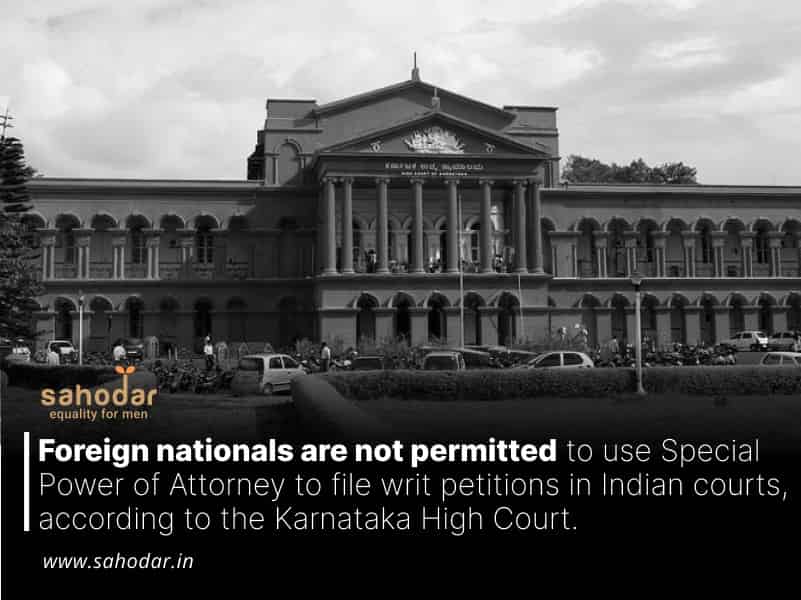The Karnataka High Court recently ruled that a foreign national cannot appoint someone via a Special Power of Attorney (SPA) from outside India to file a writ petition under Article 226 of the Indian Constitution in Indian courts.
Justice M Nagaprasanna, sitting as a single judge, rejected the petition filed by Sagad Kareem Ismael, an Iraqi national. Ismael had sought court intervention through a SPA, requesting the respondents to process his visa application from 22-02-2024 and allow him entry into India for medical treatment.
The court stated, “The power of attorney in question was executed under the Powers of Attorney Act, 1882. This Act does not authorize a foreign national to execute such a power of attorney from any location around the world and seek to initiate legal proceedings or petitions in Indian courts. The petitioner’s actions are outside the scope of what the Act allows.”
Furthermore, the court emphasized, “Powers of attorney executed by foreign nationals under this Act cannot be acknowledged and have no legal standing.”
The petitioner argued that due to the non-issuance of a visa based on his application, he is compelled to have his interests represented by the SPA holder, as he is unable to travel to India. Both the petitioner and the SPA holder hold valid passports from their respective countries.
Additionally, it was stated that the petitioner has no alternative but to seek treatment for his illness. According to the medical report reviewed by a doctor at Aster CMI Hospital, treatment is recommended for an initial period of three months, with the possibility of extension. Consequently, the petitioner is seeking a medical visa.
The Union of India opposed the plea, asserting that the petitioner, an Iraqi national, first visited India in 2012 on a student visa to pursue a B-Pharma course at two Bangalore colleges. He allegedly completed the course in 2017 but overstayed for an additional 11 months before leaving India. As a result of this overstay, his name was placed on a blacklist with restrictions until 22nd May 2019.
Furthermore, the petitioner attempted to re-enter India on 3rd November 2017 on a medical attendant visa but was denied entry. He subsequently filed W.P.No.7696 of 2020 in this Court, which is still pending due to office objections.
It was argued that the petitioner’s repeated attempts to enter India on medical attendant or medical visas for genuine reasons are undermined by his blacklisted status. Given his inclusion on the blacklist, the Union of India stated that no visa can be issued to him, particularly when applied for by his SPA holder.
Findings:
The bench noted from the records that the petitioner’s name was placed on the blacklist due to an 11-month overstay without justification in 2017, barring him from entering India until 22nd May 2019. Despite this, he attempted to enter on a medical attendant visa, designed for accompanying a medical visa holder. His entry was denied again due to his retention on the blacklist until 22nd May 2019.
It was observed that during the COVID-19 pandemic, the petitioner managed to obtain a medical visa and entered India on 2nd December 2019, staying until 18th December 2021 under that visa. He departed India only after an exit permit was issued.
The Court said, “The documents further reveal that when the exit permit was being processed, it was noticed that the petitioner removes the Visa sticker for medical attendant Visa from pages 14 and 15 in his current passport and communication to him being refused due to blacklisting.”
Additionally, the court determined from the documents that the petitioner’s name was originally Sajjad Kareem Ismael in his earlier passport and visa applications. Upon obtaining a new passport, his name was changed from Sajjad Kareem Ismael to Sagad Kareem Ismael.
Then it observed “All these maze of falsities that are projected by the Union of India and suppression of these materials by the petitioner would undoubtedly lead to dismissal of the petition with imposition of exemplary costs. Since the petitioner is represented by another person who would not be aware of these factors, this Court is holding its hands on imposition of exemplary costs.”
Subsequently, the Court concluded that the petitioner entered India twice—first on a student visa and subsequently on a medical visa and a medical attendant visa. The Court noted that due to his placement on a blacklist for overstaying and subsequent deportation upon issuance of an exit permit, no relief could be afforded to him.
Dismissing the petition the court said, “Foreign Regional Registration Officer of FRRO should cautiously deal with such applications as the petitioner has been granted medical Visa not once but twice when he has overstayed for more than two years and should not also blindly look into an opinion from the hospital and grant such Visas as bona fides of the petitioner or the persons like the petitioners are always a suspect.”

